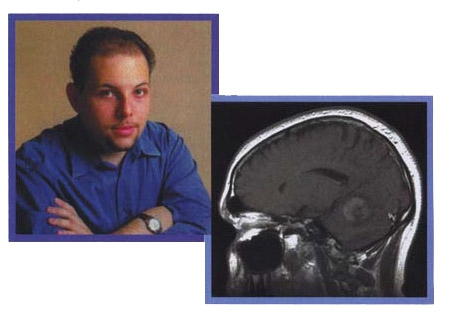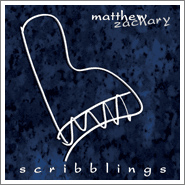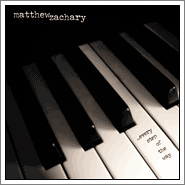


What do you do when you have a rare form of cancer, and the doctors give you little hope for a return to normal life? If you're Matthew Zachary, you write music. Then, you use that music to not only heal yourself, but also to help heal others.
At 21, Zachary was diagnosed with a rare form of brain cancer which took away much of the control he had over his left hand. When his doctors told him that treatment would probably leave him unable to walk, much less play the piano, he rebelled against their assessment and fought his way through painful therapy and treatments with the help of his musical ability. Today his cancer is in remission, and he is now sharing his success with others who are battling diseases of their own. His two CDs, Scribblings and Every Step Of The Way, are beautiful and soothing works, aimed at staying focused on the positive. He has distributed his CDs to hospitals for use in therapy with cancer patients across the country, and his efforts are being rewarded with praise from the medical community.


Your story is very inspiring. What do you hope it does for other cancer patients?
Everything relates to how I was treated as a patient - from a purely empirical vantage. Essentially, I was treated like a piece of meat. Back in 1996 the saying "treat the patient not the disease" was just a saying. Few medical practiitoners offered a balanced relationship between grounded statistical realism and the human interest component. I was a victim of that void. Being empowered by my very nature, I was able to make objective decisions and not blindly accept the words that came out of my careviver's mouths.
After my full body radiation protocols were completed, I was physically and emotionally devastated with numerous severe medical complications. It took me 4 years to recover from my post operative treatment. Within a week of completion, I was told that I would need an additional year of chemotherapy as a pallative treatment in order to increase my statistical chances of survival for five years from 60% to 65%.
After learning that the chemo would give me permanent nerve damage in my fingers and toes, I decided I would rather take my chances with no chemo and live a potentially and statistically shorter lifespan rather than lose the ability to play piano - my one and only true passion - while statistically and potenially living a longer lifespan. These were life-altering decisions I had to face and make at the age of 21.
I would not wish this on my worst enemy. My music represents my personal empowerment and fervent recalcitrance to stand up for what I believe in and never accepting anyone's opinion above my own. I hope my music offers others who suffer needlessly with this horrific disease a level of comfort and courage that if I could do it, so could they - and they they need to be the captain of their own ship to the very end.
How does your philosophy on music tie in with your story?
I live my life the way I live my art - part improv and part structure - like a good jazz tune. Every time I play one of my songs, it should be a little different and a little better. Likewise, every day I live my life, I should try to make it a little different and a little better.
My grandmother likes to say that "Man plans and God laughs." That is the story of my life. You need to play the cards your're dealt and try to be the best you can be every step of the way.
What is "inspiration therapy" and how does it work?
As a patient undergonig surgery and post operative treatment, so much of how you relate to yourself is completely disseminated. You don't know who you are because what you knew of yourself is gone and there is no certainty with the future - just hope.
All I wanted to do was maintain some semblance of my individuality and humanity while being humbled, humiliated, poked and prodded all day every day for weeks on end. Composing music and being able to (miraculously) play the piano after my surgery was all I had. It was all I knew.
The sheer visceral magnitude and gravity of the circumstances at hand gave me enough creative inspiration to express my emotions through music. However, the backstory and inspiration behind the majority of my music from that time came through the inspiration I received from others, especially other cancer survivors and their own private small steps toward recovery. That inspiration served as a therapeutic qualitative force to my quality of life and encouraged me to compose more and more during the few minutes a day I was awake. In turn, being able to compose helped me heal. Inspiration therapy. In essence, I felt better because I felt better.
The definition on the website summarizes it as best I could - for a corporate mission statement.
"InspirationTherapy" - the philosophy by which people can be motivated, encouraged, empowered, respiritualized, and given joy and hope either vicariously through or directly from the courageous success stories of others who, in their personal and professional lives, have confronted and conquered life-altering challenges head on.
Inspiration and hope can serve as a therapeutic and healing resource not just for patients and their families, but for everyone. Inspiration as therapy comes in many forms, including music. Music can be deeply significant as it speaks a universal language that can cross all borders and boundaries to any living creature.
Courage is yet another form of inspiration as therapy. On September 11th, the fortitude and strength of Mayor Giuliani and the rescue workers provided intangible hope and restored faith and security to many thousands.
The mission of Intimations, Inc. is to further the cause and increase public awareness of the importance of inspiration, and to bring to the consumer (patient or otherwise) tangible success stories, embodying the spirit of our beliefs and committment.
Blend this mission with our first featured inspiratonal artist, Matthew Zachary, and you end up with an archetype offering of mind, body, and spirit, merging mesmerizing piano solos with a miraculous success story. Hope, health and healing...now on CD!
“Inspiration – because when you feel better...you feel better!”
You are planning to start your own record company and/or multi-media company. What kinds of artists will you be looking for and releasing?
My corporate identity, Intimations, Inc. currently exists as a multi-fasceted organization with elements in the recording industry, the pharmaceutical world, healthcare, integrative medicine, marketing & promotion and artist representation.
I'm in the process of recruiting two sets of artists - independent musicians with a story to tell and some really good music to offer the world - and second, selected professional musicians who have survived a catastrophic illness and presently give back to their community. I have since met several artists who qualify for these categories. They can all be seen on the Intimations website at www.intimations.com
It's always interesting to see how musical artists succeed in arenas outside of the "normal" music industry---in your case, you have discovered a niche which deals with therapy and medicine. What would you tell other musicians who are looking to have an impact in a non-traditional way?
Everything is easier said than done but if you persevere long enough, you'd be surprised at the small successess you didn't even notice. Try to be as original as possible - again, easier said that done. There is no longer a box to think outside of since everyone is trying to one-up the guy next door who invented that box. You have to think outside the outside, even though that makes no sense whatsoever.
My music has been clinically endorsed - Clinical! - I wrote this stuff for me. I'm no therapist. I'm just a guy who trying to live his life. I didn't ask for this to happen, I'm just sort of along for the ride like coral on a blue whale. There is no magic spell, secret recipie or instant scratch-off opportunity for success. It takes time, work and - sometimes you win and sometimes you lose. That's life.
Bernie Siegel has said, "Everyone thinks life isn't fair. Well, I've got news for you - life is fair. The problem is that everyone likes to complain too much."
What do you hope to accomplish in the next five years?
On the music side, I would like to be the next George Winston, touring the world with a fan base and album sales in the millions (dare to dream). On the healthcare side, I would like to expand on my national public speaking endeavors and write a book. I will continue to give back to the cancer community in any way that I can for as long as I live.
When we cure cancer, then I'll worry about a second career option.
Anything else you'd like to add...
"Life moves pretty fast. If you don't stop and look around for a while, you may miss it."
